Our Year of Watching Elon Musk Ruin Absolutely Everything At Twitter
what have we learned from this year of watching Elon Musk repeatedly, endlessly fail?

Almost exactly a year ago, Elon Musk walked into Twitter’s offices holding a white porcelain sink, his suspiciously puffy face wearing its characteristic spaniel-like, victorious grin.

Here was a man who had inadvertently Tweeted his way into being legally compelled to buy a social media website that he both adored and despised.
Here was a billionaire who existed in a flop-sweat scented bubble of affirmation, who spent every day being reassured that he was one of the greatest minds of our generation, a modern lord capable of ushering humanity into space.
Here was an oligarch who’d reasoned, with supreme confidence, that jerking the chain on the Twitter employees and users who had made fun of him before would be child’s play, a little game he’d only need devote a tiny fraction of his Dr. Manhattan-like cognitive energy to doing.
Here was a fool.
HUBRIS
In the fall of 2022, most people still thought that Elon Musk was a pretty smart guy (if they thought about him at all). They assumed, since media repeatedly told them so, that he really was an outlandishly brilliant engineer who had managed to master rocket science, electronic car engineering, and software development.
So too, did people assume that Musk was personally responsible for the various fancy technical innovations that powered his various highly-profitable companies. Children’s libraries stocked easy-reader books about his grand achievements. Even fictional characters in Marvel movies and Star Trek TV shows talked about him with awe, placing him in the same category as Sir Isaac Newton and the Wright Brothers.
At the time, Musk was still a minor cultural demigod, endowed with a bit more charisma (and more aggressive plastic surgeons) than the other, dead-eyed tech oligarchs he was so often compared to.
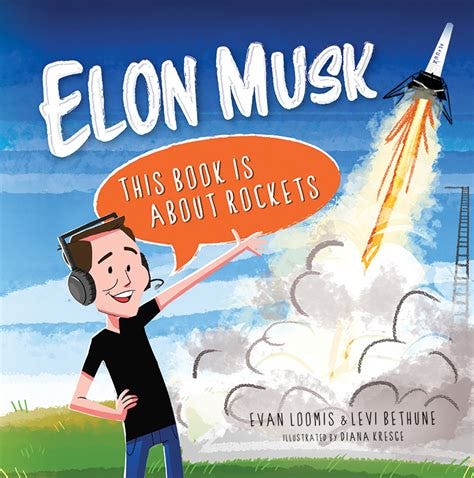
Yes, a lot of us who spent our time wallowing in the same Twitter swamps that Musk had just taken legal possession of did know that Musk’s legendary reputation was almost entirely bullshit in early 2022.
Among my own extremely online social world, many of us figured that out back in 2018, when Musk had attempted to take over rescue operations for those little Thai boys trapped in the depths of a cave, proposed an absolutely awful idea for a cave submarine, and threw a gigantic fit when he was rebuffed – eventually stooping so low as to accuse one of the heroic cave divers who had actually saved the children of being, and I quote, a “pedo guy.”
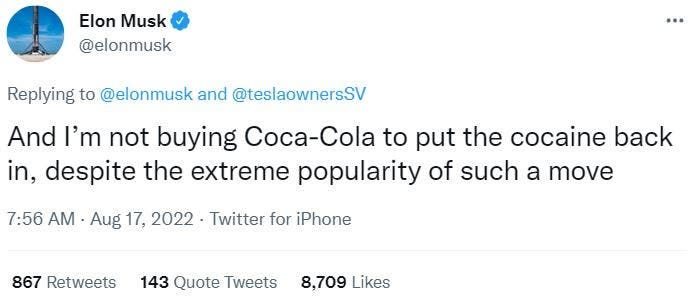
It was objectively bat-shit behavior on Elon’s part, an echoing fart in a formerly stark-silent library. And still, Elon largely got away with it. But at the same time, he started becoming much more active on Twitter - a move that would, as it turned out, begin the chain reaction that would make the public view him less as a super-genius and more of a running joke.
Elon posted more of his weird little guy takes, and more people began noticing his pedestrian weed jokes, his incredibly adolescent world view, and how he posted at a rate that seemed suspicious for a guy who was, supposedly, the CEO of more than one major company.
Inevitably, as Elon more and more frequently showed his metaphorical ass (and possible his actual one, I refuse to check) on social media, the media began to, in its shuffling, slow way, take notice. Reporters began to write more stories on Elon Musk’s bizarre habits and extremely dubious technical expertise, and about how those shiny, sustainable Tesla cars also had a habit of bursting into flames and incinerating the occupants.
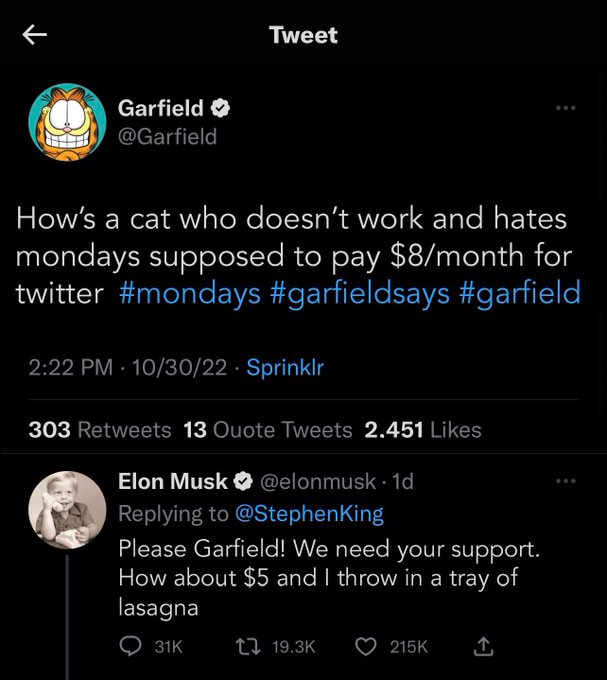
Amused by these revelations, and scenting the iron tang of billionaire blood in the water, Twitter’s vast army of shit-posters began to turn more of their attention towards Elon’s incredibly divorced online presence. And like so many wealthy, grotesquely insecure dudes of his ilk, Musk felt these insults in the very depths of his gossamer-delicate soul.
Making matters even worse, in March 2022, the US SEC noted again that they had the authority to subpoena Elon Musk about his Tweets related to Tesla (which they had charged him with securities fraud over in 2018) and “urged a federal judge not to let the executive get away with tweeting with abandon,” per a TechCrunch story at the time. Musk was outraged by the offense, claiming that his sacred First Amendment right to Tweet whatever popped into his head was being cruelly violated by Big Government.
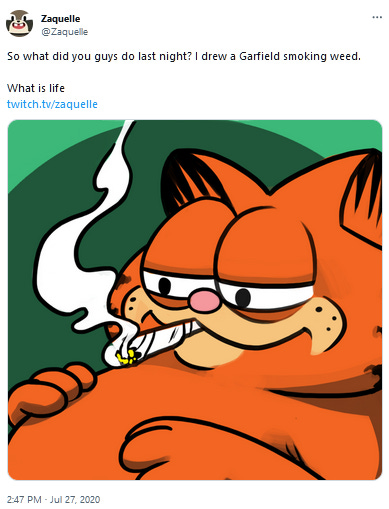
But instead of shrugging off the insults of 26 year olds named BigTiddySonic69, instead of logging off for a bit to flop around like a water buffalo in a man-made swamp filled with cold hard cash until he felt better, instead of easing back a bit on Tweets that constituted security fraud - well, Elon decided that he was going to make both BigTiddySonic69 and those muzzle-loving bastards from the federal government pay. He briefly kicked around the idea of starting his own social media platform, and then he got a wonderful, awful idea. He’d buy Twitter himself.
The rest is history.
It’s true that Musk bought Twitter because he let his personal beefs spiral hilariously out of control, and it’s also true that he bought it because he firmly believes that laws shouldn’t apply to special, special god-kings.
He also bought Twitter because it was not enough for him – for this man who already had too much – that huge swaths of the world admired him, considered him a genius. No, he needed Twitter’s army of shit-posters, that mass of clever weirdos with profile pics that featured a big-assed Garfield smoking weed, to admire him too. And if he couldn’t win the local wildlife over with his posts alone, he’d make those bastards adore him with force. Or destroy the website entirely.
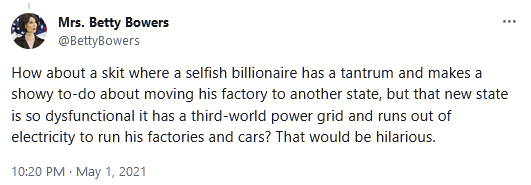
He was blissfully unaware of how good he had it, of the fact that the teasing he’d been so unfairly subjected to still remained largely on Twitter, or of the reality that the media still ran far fewer stories on his intensely fucked business and personal affairs than they could be.
This happy state of public affairs largely persisted for Elon Musk right up until the day he walked into Twitter’s offices with a severed piece of plumbing.
Which may be the last truly happy day he’ll ever have.
As soon as Musk took control, the broader world started to really take notice of the cracks in the carefully engineered and marketing-consultant crafted picture he’d presented to the public. They read about his trans daughter who wanted nothing to do with her sophomoric and openly transphobic father, his string of miserably failed relationships, and the time he attempted to talk a repulsed flight attendant into bed by offering her a fancy horse.
They became aware of his second-grade attempts at Twitter humor, and his ever more obvious sympathy for the white supremacist goons that swiftly gathered to suckle their new overlord’s toes, and of his weird obsession with the opinions of someone who willingly chose to call himself “catturd.”
Eventually, they heard about Elon’s willingness to directly interfere with the course of the Ukraine War by intentionally tweaking access to Starlink, and his environmentally disastrous Space X shuttle launch soon after taking over Twitter. And on, and on, and on.
Suddenly, the kind of people who previously wanted to be seen in a shiny new Tesla were starting to have second thoughts about what their colleagues would think. Suddenly, the major media outlets that had once anointed Elon Musk fan as Silicon Valley’s scholar-emperor were realizing that they could attract even more eyeballs by writing about his fetish for producing lots of children with keyboard-mash names, his latest mechanisms for torturing Twitter employees, and his latest innovations in blowing up both rocket-ships and sensitive ecological areas.
Almost instantly, Elon Musk’s name stopped being a synonym for innovation: it became a punchline for jokes about desperate, divorced 50 year old dads who are just a little bit too interested in smoking up their teenage children'’s friends.
I can think of few cases in modern history where someone once as revered and respected as Elon Musk decided very intentionally to take that reputation, coat both himself and said reputation in high-proof gasoline, then light a match. But then again, we’ve always known that Elon Musk possesses a certain kind of generational talent.
So, here we are, a year later. The dog has caught the car. The monkey’s paw has curled. The dark and terrible energy that has always coursed through Twitter, right from its beginning, has now been transferred to him. He is eating its sins. He is not having any fun. Elon has ruined Twitter, yes. But he has also ruined his own life in the process, like a king in an ancient myth who grievously harms himself trying to kill a fly.
And the fly is a Twitter user named LigmaBalls69.
This is what Elon Musk deserves.
CHAOS
Here is what a year of watching Twitter die looked like for me.
It is strange to say this, but I look back on those first two months on Twitter after Elon’s takeover with a certain amount of fondness. It was fun.
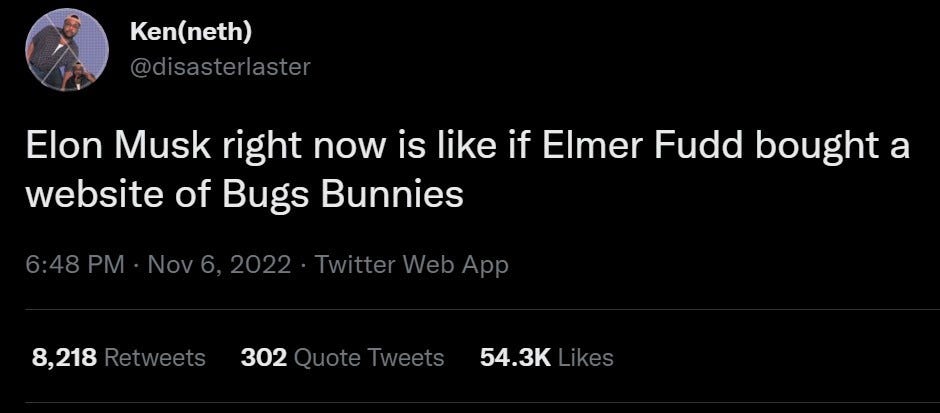
Us hardcore-Twitter degenerates, us horrible Internet fauna, us creatures who existed in full awareness that Elon Musk wanted to kick us off the platform in favor of sniveling NFT boys who actually liked him: we collectively resolved we were going to be as fucking annoying as possible.
And we were.
Early on, the mood on Twitter among much of the core user base was very much that of a horde of gleeful maenads intent on tearing apart stray men - although this sense of perverse, violent joy wasn’t shared by the employees who Elon Musk swiftly set about mistreating and degrading in often outright-illegal ways (including, in the case of former Twitter ethics lead Yoel Roth, reprising his incredibly evil fake-pedophile accusations trick, forcing Roth to flee his home in the wake of threats).
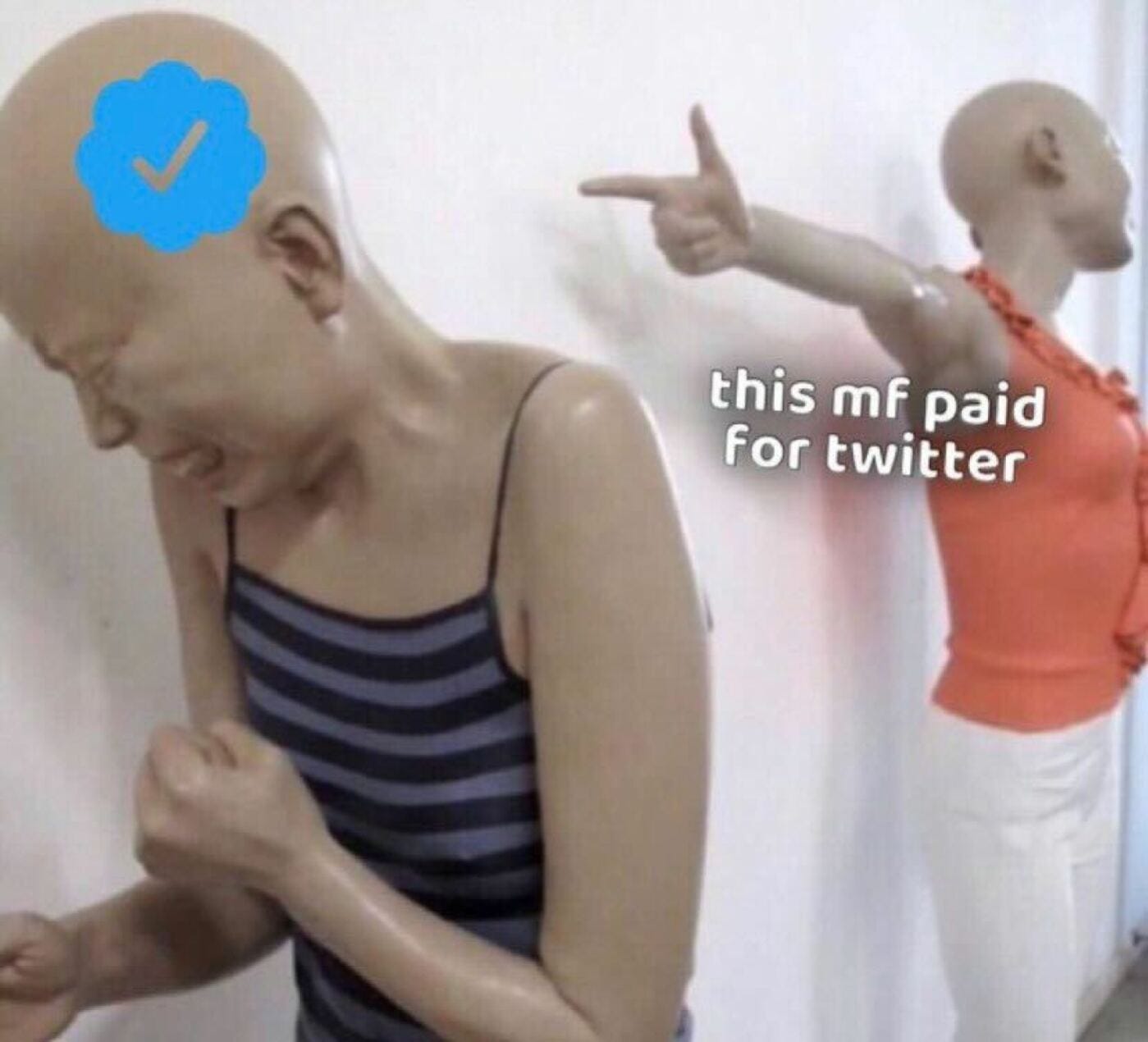
Yes, our online country had been invaded and handed over to a dip-shit despot who promised to destroy it, who probably was already storing his urine in Mason jars in the Twitter offices. Yes, Elon Musk planned to defile a totally unique online resource that provided vital information about breaking news and disasters to large swaths of the world, forcing huge numbers of people and entire industries to scramble for a backup solution. But we weren’t going to make it easy for him.
I don’t think anyone really believed that those months of gleeful shit-stirring and offensive memes were actually going to chase Elon off, but it was an important symbolic gesture nonetheless, a virtual middle finger in the face of all modern oligarchs who now demanded not just our money, but also, pathetically, affection they had no intention of earning.
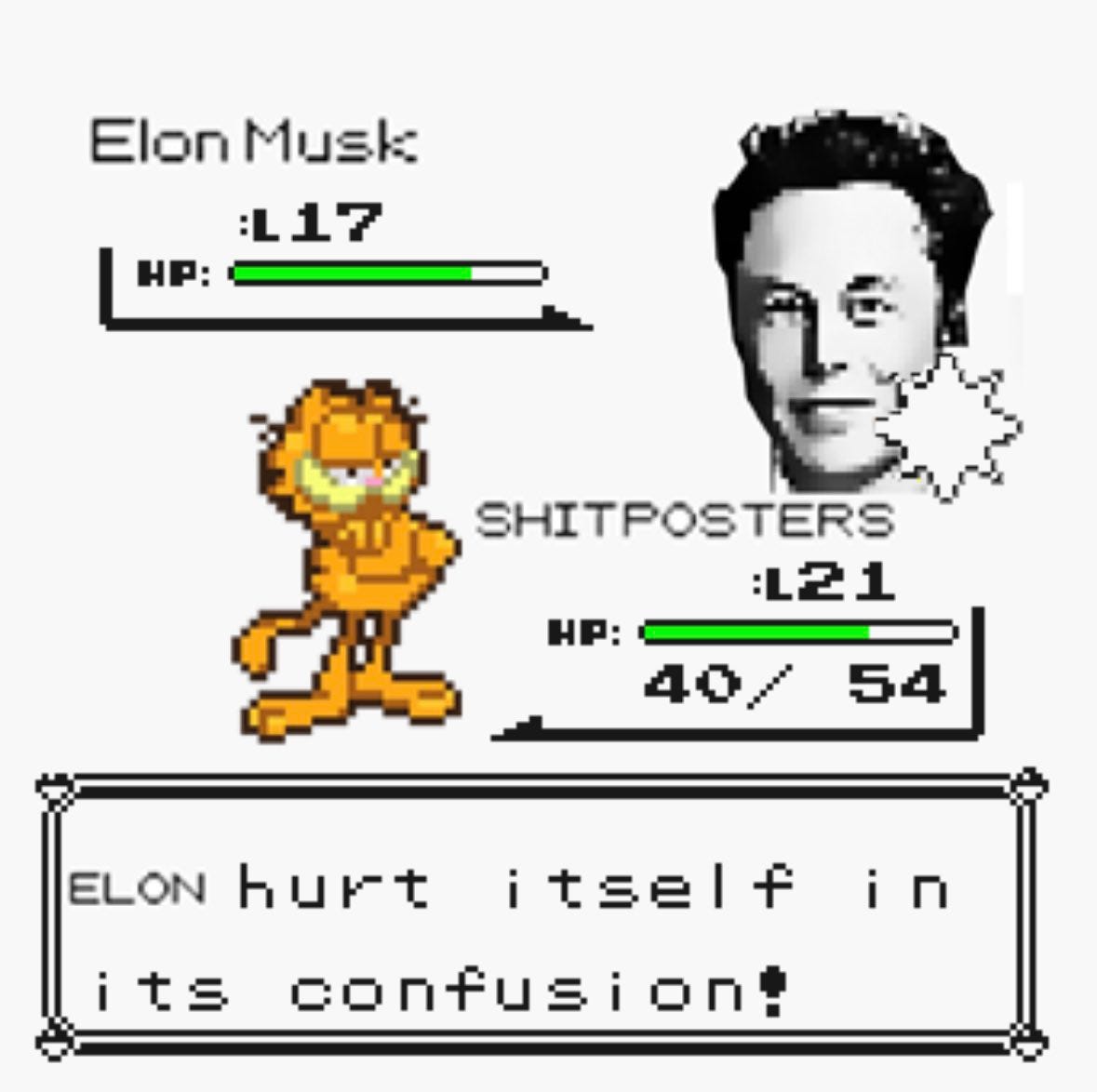
If our old world was ending (and indeed, it was, and it has), we were going to send it off in the exact style in which it had lived. During those months leading up to the end of the year, we were shitty little online pirates, identifying ourselves to each other, expressing our appreciation for the companionship we’d given each other over the years.
We reflected, via means both sentimental and shitpost, about how we’d come together on Twitter respond to everything from horrific global tragedies to really, really funny things - like the time we demanded to see the Butthole Cut of the 2019 Cats movie, or when Donald Trump got Covid and we all got to see that fleeting flash of terror in his eyes. We were all part of a collective wake for the old Twitter, for the animal spirits that once governed the place and, ever so often, pushed it over the edge into the sublime.
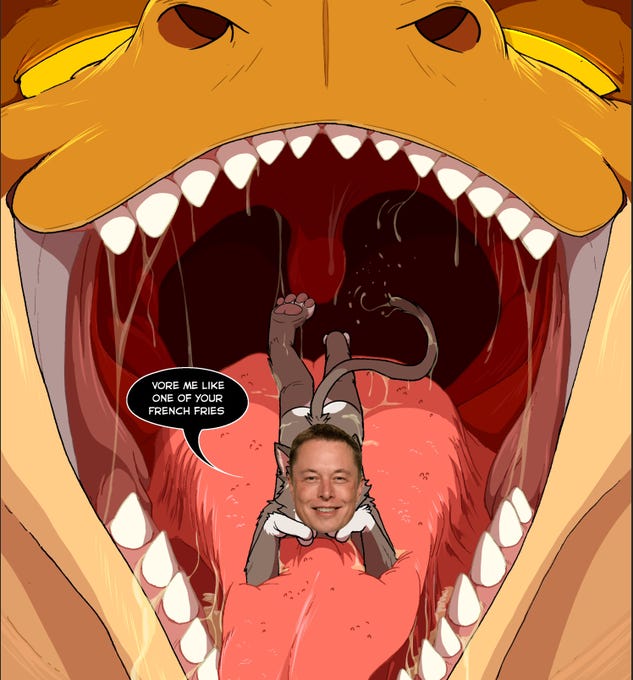
It was an orgiastic online ritual, carried out with insults, mass-spamming of any and all Twitter public comment accounts, and memes depicting un-tastefully nude Jar-Jar Binks and Elon Musk’s face Photoshopped onto upsetting pornography involving hungry, hungry dragons. The final energy burst put off by a dying, profane star.
As I participated in all this, I felt a strange sense of excitement about the future, about the unexpectedly open and strange possibilities presented by the sudden downfall of the social media website where I’d been hanging out for over a decade. You could even call it optimism, which had become a horribly rare sensation for me since 2008, the year of both the financial crisis and my first Twitter account. And as I watched Twitter be systematically dismantled, my anger over the entire thing was mixed with a feeling of relief, like an unnameable weight was being lifted off my shoulders for the first time in well over a decade. For the first time in my adult life.
Perhaps Elon had, in his own idiot fashion, accidentally kicked off the start of a new epoch in social media - and marked a clear end to a decade in which we saw social media companies wreck immense damage on our societies and our sanity. It was terrible that this was happening in such a stupid and sudden way, yes, but by forcing people to flee Twitter, the social media world I’d spent my entire adult life in would, inevitably, be shaken up.
Perhaps, I thought, this was the universe telling me that it was time to get off social media entirely, to figure out who I was without the constant, chorusing input of my Internet friends, from the vast and ruthlessly addictive plains of Online.
Maybe.
EXODUS
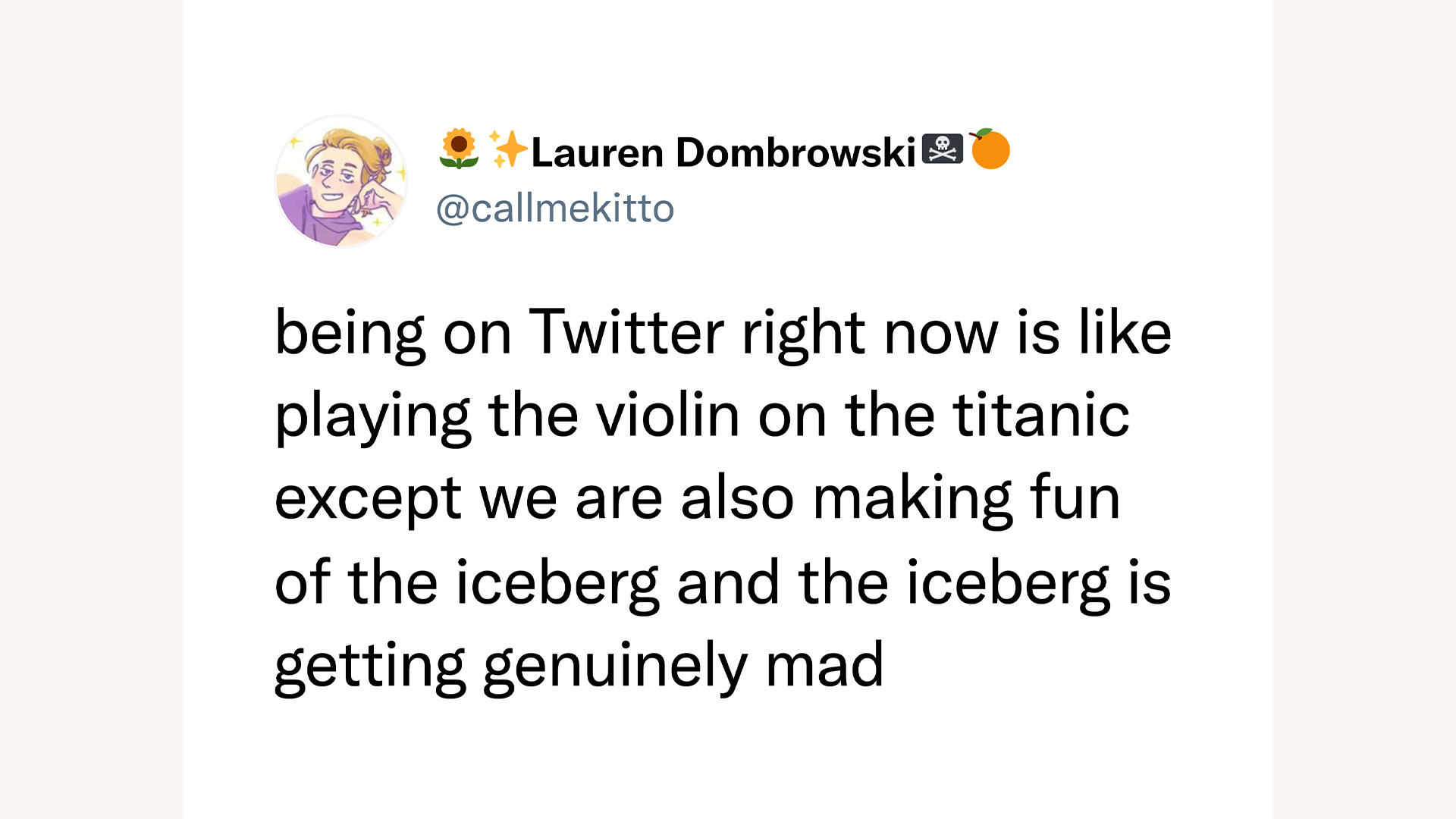
By New Year’s Eve 2022, the jubilant meme-making of Elon’s first days at Twitter had settled down, and the hivemind had begun to start fumbling around for an exit, for a clear sign about where we were supposed to go next. Twitter users had entered a weird liminal zone, stuck in the social media equivalent of uneasily waltzing on the deck of a ship that was very, very slowly sinking into the sea. The site started to show its first true signs of degradation, as features broke and were never replaced, as things began the slow slide towards shittiness. Mostly, we were surprised it was still working at all.
Like so many of my Twitter friends, I spent some time trying to make myself like Mastodon. Sorting out the impressively non-intuitive user interface was manageable enough, but finding all the people I followed on Twitter, and seeing their posts, remained a pain in the ass, and posts loaded painfully slowly.
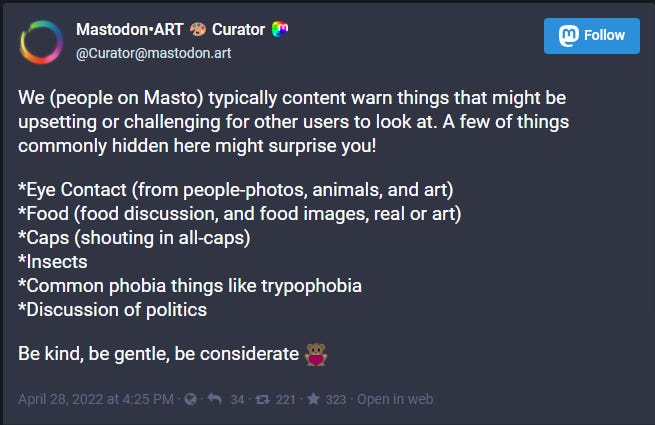
I also wasn’t quite sure what to talk about on Mastodon. The overall vibe felt something like a campus computer lab where everyone knew each other and would stare at me with judgement in their eyes if I tried to make a dumb joke. Long-time Mastodon users groused about the uncouth behavior of new arrivals (how dare they not put a content warning for “eye contact” on a picture of a dog!), big servers kept blocking each other, and, most importantly of all, I didn’t find Mastodon fun. I kept unhappily slinking around the edges of Twitter.
And while I still hung on to a bit of the optimism I’d been feeling that fall, it was rapidly ebbing away. I was watching as barbarians gleefully mangled a childhood home that I had both loved and hated in turn, and I still didn’t know where the hell I was going to go - or what I’d replace Twitter with, or if it was even a good idea to attempt to replace it all.
But I didn’t want to be cut off entirely from social media, in the depths of my extremely online heart. I just wanted to be able to write weird jokes and meet new people on a social media platform that wasn’t run by a gibbering billionaire idiot who vocally hated me, my friends, and humor.
That winter, I began to despair, just a little.
Was this it for public, text-based social media platforms? Was this the final revenge of the Pivot to Video? If I wanted to stay at all connected with the world, was I going to have to start making fucking TikTok videos? Would I be exiled to a medium that I wasn’t interested in, which moved with the excruciating sluggishness of video as compared to the lightning-fast speeds at which I read an endless, endless stream of text on Twitter? And, worst of all, was I going to be forced to use a platform where people expected you to be perceived?
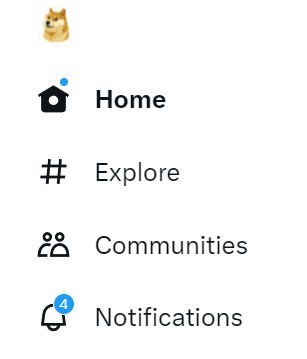
I despaired, and meanwhile Twitter kept getting, inevitably, worse.
In April 2023, Elon Musk turned off blue checks for everyone, then turned them back on again, to be used exclusively by the vacuous, crypto-shilling LinkedIn gerbils foolish enough to pay him $8 a month.
Thanks to this shameful, self-destructive move, the entire site instantly became far less useful for news, which was the main reason I, and many other people, still looked at it. Hordes of accounts sprang up imitating everything from major Fortune 500 companies to government agencies, and Twitter’s tiny, exhausted security team were totally unable to keep up.
Making matters worse, the first replies you saw in every single vaguely popular Twitter thread quickly became dominated by people who’d paid for blue ticks - who who were, inevitably, the exact kind of guy who corners you at a bar to yell at you about something you don’t care about, then acts like you’ve just shot his cat when you extricate yourself from the situation.
Twitter had once been a sketchy yet loveable dive bar where you accepted a non-zero risk of getting stabbed in the face with a butterfly knive in exchange for endless entertainment. Now, it had become a over-priced Palo Alto gastropub where Stanford MBA students who aspire to turn living, dreaming human beings into profitable meat-slurry bellowed at each other over $20 cocktails that taste like band-aids.
And then, just as it became clear that the Great Blue Checkmark Purge had truly broken the site’s culture once and for all, as I realized that I was becoming faintly but clearly nauseated every time I opened the Twitter app, a generous friend offered me a Bluesky code.
I dove for the exit.
By the time mid-May rolled around, I’d managed to ruin that brand-new social network with pictures of a sensual 1980s sitcom alien. (I wrote about this here). Almost instantly, was having more fun than I’d had on Twitter – or on the internet in general – than I’d had in years, suddenly freed from the fear of life-destroying harassment that had kept me constrained on Twitter ever since 2016. Not that I was naive enough to believe that it couldn’t happen on Bluesky, or that I’d found some sort of social media promised land.
Mostly, I just needed a change of venue.
Bluesky swiftly replaced Twitter as my main online home. I found that I didn’t miss Twitter at all. Still, I dipped into it fairly regularly for Ukraine War updates, although even those were slowly becoming harder to find. And while I was having a wonderful time on Bluesky during those early days of spring, I was horrified by what I saw whenever I did poke my head into the old country.
SOCIAL MEDIA IN ITS MOST PRURIENT FORM
Hamsters in blenders.
All of a sudden, Twitter really wanted to show everyone hamsters in blenders.
It was May 2023, and Twitter’s autocompletion feature had gone horribly, horribly wrong.
Twitter’s autocompletion feature used to suggest benign terms when you asked it about benign things, like small animals and children’s books - and it would also steer you away from the most horrible possibilities when you fed it less gentle words and phrases. Then, seemingly overnight, it morphed from a mundane utility into something actively dangerous.

Now, searching for common household pet names meant you’d be suggested search terms that would come back with pictures and videos of extreme animal abuse - video that would automatically play if you happened to be browsing the site with autoplay on. Even more horrifically, searching for the word “child” got you auto-suggestions linked to child sexual abuse material.
And there was plenty of horror to go around. The gutted moderation team and Elon’s relentless, deranged cost-cutting meant that far more loathsome material was slipping through Twitter’s never-great filters than it used to.
After the May 6th mass shooting in Allen, Texas, I was both saddened and angered by just how much incredibly graphic video and photos of the massacre now inundated Twitter, to a degree I’d never seen before for prior violent tragedies. Many of these videos and images weren’t flagged with a content warning, meaning that many unsuspecting people, including children, saw them. (I wrote about all this here).
Twitter staff eventually caught on, and many of us watched in real-time as they fumbled with fixing the error (which, according to former Twitter head of trust and safety Yoel Roth, was so hard to break in the first place that its failure ‘almost defies probability’). Eventually, they turned off auto-complete entirely. It remained turned off for months.
The auto-suggest debacle would prove to be a gentle prelude to what was coming in July.
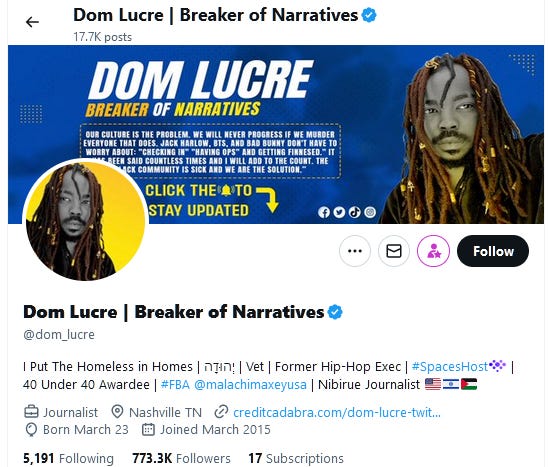
That’s when a very popular and very unhinged QAnon wacko named Dom Lucre decided to post imagery from one of history’s most notoriously repulsive child sexual abuse material videos on Twitter. As is typical with these accounts, he claimed he was doing it to “raise awareness” of child trafficking.
As is also typical with these accounts, this was a disgusting lie to cover up the fact that he’d figured out that posting child abuse photos and videos is a great way to drive eyeballs to your social media account. He even slapped his personal Dom Lucre watermark on the images, which I presume was done to make sure that no other QAnon accounts could earn some sweet clout from posting CSAM on the Internet.
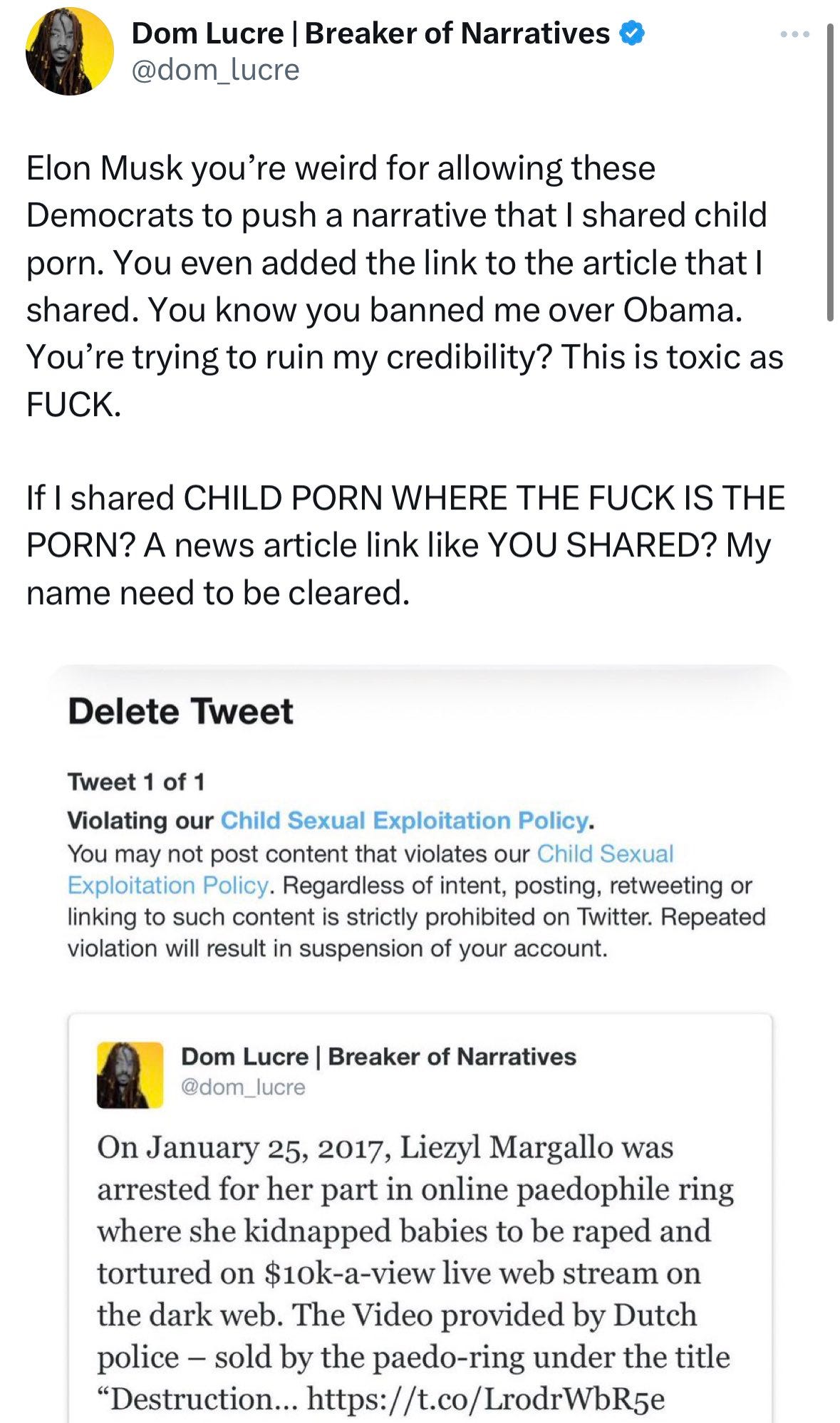
After four days and millions and millions of views, Twitter got around to suspending his account, a move that was quickly met with gibbering rage by the QAnon freaks who made up Dom Lucre’s user-base.
Elon Musk, as usual, caved.
He reinstated Dom Lucre’s account, and then told a blatant lie about how only Twitter employees had seen the images. Then, a few days later, Elon Musk sent Dom Lucre a check via Twitter’s new affiliate program for big accounts. Lucre whined about the check being too small, and promptly began pushing a narrative about how he’d been suspended for posting copyright music, and how the mainstream media was attempting to assassinate his character.
To this day, Dom Lucre appears to have suffered no legal or personal consequences for posting child sexual abuse material on Twitter, where millions could see it.
Tragically, Dom Lucre making bank off of posting child sexual abuse material is just one grotesque manifestation of the horror-pit that Twitter has now become. People now regularly report randomly coming across child sexual abuse material on Twitter, and their automated protection tools still appear to be working far less effectively than they should be. We can safely assume they’re going to do an even worse job at dealing with the ever-growing risk of an Internet filled with AI-generated CSAM, too.
But hey, Australia did recently fine Twitter a whopping $388,000 for completely failing to adhere to basic standards around removing and controlling child sexual abuse material. That’ll leave a mark.
Beyond CSAM, Twitter has also become a festering cesspool of disinformation, conspiracy theories, and horrifyingly violent imagery, on a scale vastly outpacing the bullshit that used to be present on the platform before.
This was brought home to me when I was trying to search for information on the devastating wildfires in Maui, the kind of natural disaster where Twitter had been, less than a year ago, the gold-standard source for up to the minute information.
When I ran those searches on Twitter this August, almost all of the top results came from batshit-insane disinformation accounts, who were tirelessly pushing the idea that the wildfires were the result of a secretive space-laser - excuse me, “directed energy weapon” - that was, of course, being controlled by a secretive globalist cabal (if you know what I mean).
Information from reputable outlets about the Lahaina wildfires was consistently and constantly pushed to the bottom of my search results, and it proved almost impossible for me to actually keep up with the latest information on Twitter. Instead, I was served an endless, repeating cycle of the same idiotic, blatantly anti-semitic conspiracy theories every single time I refreshed the website.
A pattern that was, not incidentally, the same as the post-Elon Twitter experience writ large.
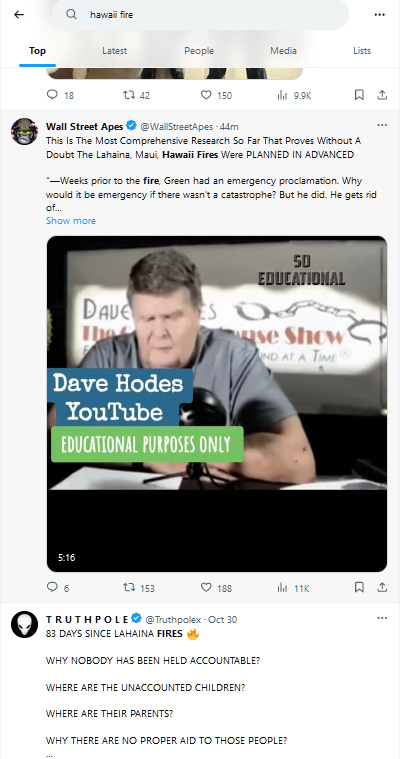
I’ve heard that Twitter is now grotesquely failing to control misinformation about the Israel/Palestine conflict, and that the site is now even more full of incredibly graphic, eternally-haunting violent video and pictures than it ever has been. The situation has grown so bad that the European Commission has begun to investigate, and Elon is, for his part, mulling over removing his expensively-purchased portal to hell from Europe entirely in return. (He claims that he isn’t going to do it, but it is also important to remember that Elon Musk is pretty much always lying).
In less than a year, Elon Musk has successfully put a stake through the heart of what had once been the Internet’s most useful source of breaking, useful information. News outlets continue to struggle on, hampered by the bizarre, recent decision to remove headlines from external links on Twitter posts, while major OSINT accounts (some of which I relied upon during the early days of the Ukraine War) are moving on to new pastures, or closing up shop entirely. What with Elon’s latest emissions about making people pay to post on the site at all, we can assume that the situation is just going to keep worse.
Maybe murdering Twitter as a source for news is what Elon wanted all along. Maybe he’s just too stupid to realize that this would be the inevitable result of his hollowing out the company, of destroying even the eternally-iffy protections that used to exist on the site before, of actively emboldening - and paying - the absolute worst people in the entire global information ecosystem.
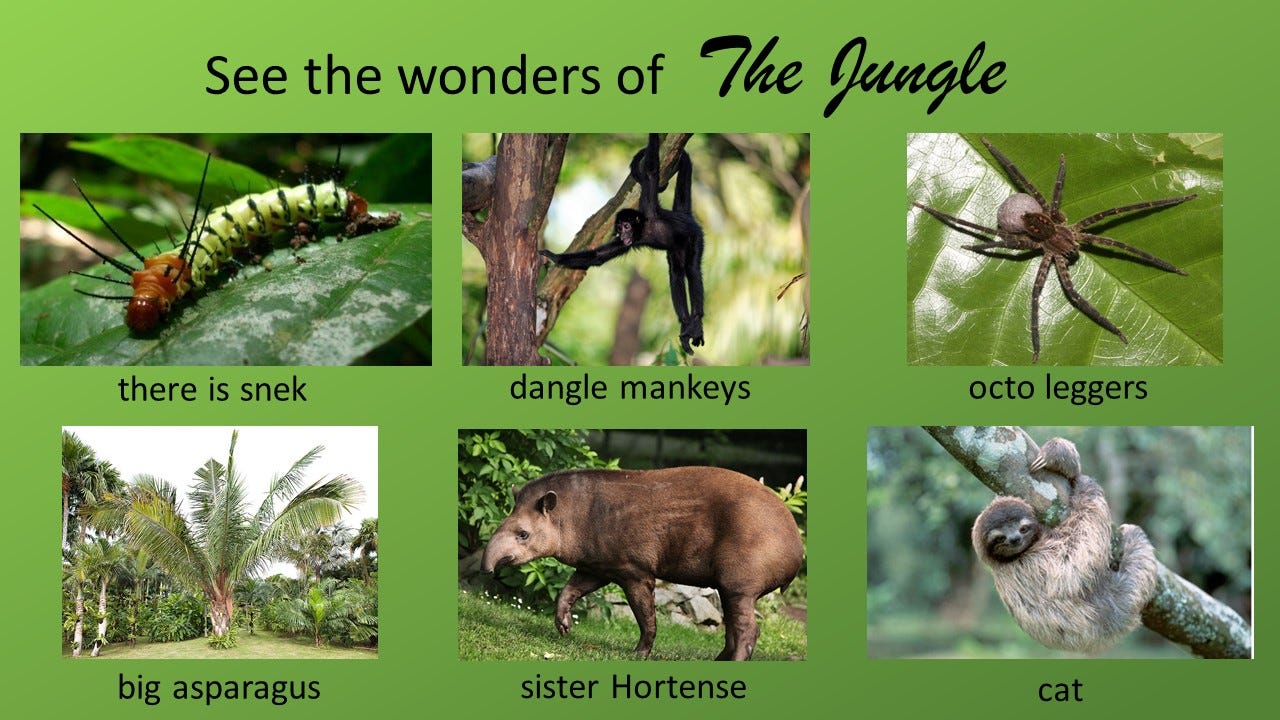
Whatever his actual intentions, the results are the same. The fetid Twitter rainforest where we used to live, where you’d occasionally find rare emeralds and medicinal herbs amongst all the venomous centipedes and stinging nettles, has been clear-cut for profit. And the future stretches out before us unknown.
SO WHAT NOW?
Christ, I don’t know.
I’m still trying to make sense of all these epochal happenings in the social media mudpit in the last year, these gigantic changes in the online soup in which I’ve been flopping around – sometimes more merrily than at other times- since I was in middle school. But then again, so is everyone else.
I mentioned that I felt curiously optimistic in November 2022, during the first days of the Elon Musk handover. As I write this, I’m feeling just a little bit optimistic again, although it’s that guarded, careful optimism you develop in the absence of any reasonable alternatives.
It is true that the social media world of 2022 was incredibly ossified, totally dominated by lumbering beasts that had seen both enormous controversies and very little material, major changes in well over a decade. 1 Elon Musk’s determined effort to convert Twitter into a shit-hole has forced people out into the wilderness. And with wandering, comes, well, innovation.
Although I don’t like Mastodon, I think the general idea of federated social media is incredibly valuable, and in an way, I’m grateful that Twitter’s twitching death has convinced so many people to try out platforms that are experimenting with the idea.
I’m particularly interested in the AT Protocol that Bluesky is working on right now, which, at least in theory, would solve what I see as the key failing of Mastodon’s Activity Protocol (among other failings): you’d be able to move not just your account name but also all of your data to a new server, whenever you felt like doing it.
That’s a revolutionary idea in the modern social media world, and it’s particularly appealing now, at a time when so many of us have just watched Elon Musk take a match to the wall where we’d written down so many of our hopes, dreams, and sexy Sonic the Hedgehog jokes.
Musk, in his perverse way, reminded a lot of people that their favorite social media hangouts - and their writing, platforms, and social networks built over the course of decades - can be taken away at any time by a single corporate demon with the relative intellect of a tennis shoe.
Perhaps all these people sharing such a sobering realizations means that federated platforms will hit critical mass. Perhaps Bluesky’s interesting, if nascent suite of tools that let you make your own algorithm, instead of having your corporate overlords dictate one to you, will force platforms to focus on building tools that actually make social media better to use - instead of focusing all their energy on scrapping like jackals over juicy morsels of people’s personally identifiable information.
Maybe we can start taking back some human control over our ever-more online lives, in this era of ever more disturbing threats from fake-AI driven chatbots taken over our jobs to do them much, much worse, but also much much more cheaply.
This is, at least, what I want to believe will happen.
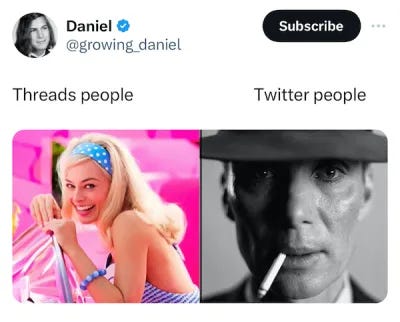
I am also weirdly heartened by the fact that Meta’s Threads has completely failed to become the steam-roller Twitter substitute that so many pundits confidently assumed that it would become. (Yes, Meta claims it intends to federate Threads with Activity Protocol someday, but Meta sure fucking says a lot of things). While people do use it, it has attracted a far smaller audience than one might have assumed.
And while it’s hard to identify the exact reasons behind this, I’d like to think that one of them is “people are finally figuring out that Meta is evil.” (I wrote about that here).
And I’d like to think that another is that people are growing tired of social media platforms dominated by major corporations and by shadowy algorithms, places whose overlords don’t even bother to hide the fact that the user is not a person but a raw, data-generating resource.
I have no idea if Bluesky and Mastodon and the other platforms that are now rising up to challenge Twitter will be able to break us out of this cycle of endless extraction, will be able to bust out of the walled online gardens that we’ve spent the last fifteen years being herded into. But maybe there’s a chance, even a very small one, that we come out of all of this chaos and billionaire stupidity with a healthier Internet than we did before.
Ultimately, I want Twitter to die.
Both so something new can be born, and also because it is unpleasant to watch the life flow out of it so slowly.

I want it to be put out of its misery, like a hound dog that’s contracted rabies and is now threatening to bite the family that it once, imperfectly, adored. But of course, that’s unlikely to happen, at least not in the final, satisfying way that I think so many of us former Twitter denizens want it to happen. Elon Musk surely intends to keep whipping his fly-eaten, undead prize pony over the next hill for a while to come, and there will continue to be people who flock to it to watch the spectacle, to see the blood, to smell the rotting flesh.
I won’t be one of them.
While TikTok hit big over the last five years, it’s also a platform that doesn’t operate in a materially different way from the others: it’s still a algorithm-based content churn machine with opaque moderation decisions run by a giant corporation. ↩
